#are i use both depictions to provide insight on his character
Explore tagged Tumblr posts
Text
... shamefully deletes what i wrote about this being a SHORT post, have my personal highlights/thoughts from reading the preview of the fnaf movie novelization lmao
- he is an idiot and a nerd. “ooohh mike is so scary” “michael is intimidating he’s terrifying” he is EXHAUSTED and OVERSTIMULATED sitting in a mall, he is building a tent with napkins and a paper cup and immediately knocking it down ( extremely normal about the constant theme of alluding to camping by the way ), he is throwing his burrito wrap in the trash like it’s a basketball and thinking “score” before immediately cringing at himself. that’s not scary that’s a homosexual. he’s so boyfailure
- speaking of homosexual he is so gay in this single chapter i’m not even joking. talks about rarely ever getting dates with girls, not really being capable of chivalry or reciprocating when they did, did not pick up on the ice cream shop employee being into him. and yet the only person he mentions really liking being around is jeremiah ( coworker in the mall scene, also yet another jeremy if you catch my drift- ) and offers to buy them both shakes when he’s fucking Broke… mike schmidt i know what you are
- his food was too spicy i am making fun of him for it ( and if i may speak about lowkey reinforcing my… abysmal diet headcanons lmao )
- in this version he first sees the kid he thinks is in danger surrounded by plants and holding a toy…. you will be seeing me on the news
- confirms mike is 25, which as people are pointing out…. would mean garrett was taken in 1987….. okay
- now i haven’t fully elaborated on this yet bc ngl i have never SETTLED on concrete thoughts ( and a lot of traits indicative of this tend to overlap with his severe ptsd ) but oh my god michael and neurodivergent traits real. staring directly at the way he operates socially, the missed social cues, the overstimulation in the mall. things for me to spin around.
- he is so like… clearly upset about his wasted potential. he so DEEPLY wishes he were able to make something of his life ( also makes me think about how, in game michael’s case at least, it also has to do with just being his own person ), thinking about the different opportunities he could’ve taken ( notable thing to me was mentioning liking building things… ), it’s so obvious how stuck and lost he feels yet instead of emphasizing the tragedies in his life as the cause all he blames is HIMSELF. he’s convinced that HE is the root problem that he should be someone different i’m so glad i got the sheer amount of self hatred and guilt with both mikes correct i’m gonna go eat glass now
- with the fountain scene— there are VERY specific descriptions of the blood itself triggering his memory enough to make mike’s thoughts go dark, the novel emphasizes how much it plays a role in his uninhibited reaction which… makes me think. about what specifically not sure but i have ALREADY been considering just how reliable his memories of the day garrett got taken are and this is reinforcing me highly doubting that they are! especially with the way fnaf tends to establish backstories trauma very well could have fucked with what we see of his memory.
#idk why i'm surprised you give me text to analyze about my blorbo and i go crazy over the smallest things#ESPECIALLY bc michael has had so little material for so long oh my god i'm winning#yes i am Slightly equating the two mikes because they ARE meant to be different versions of one another as different as their experiences#are i use both depictions to provide insight on his character#anyway. i told you he's gay HDSJFGJ#alright i'm gonna spend the majority of my night editing but i am nearing the end of the Big Tasks it'll be a calmer night#i am reaching the end of the torture labyrinth#⁂ ・゚: i was looking for a job‚ and then i found a job‚ and heaven knows i’m miserable now ➛ ooc
11 notes
·
View notes
Text

Thank you for your insightful tags @a-bottle-of-tyelenol !
And I hope you don’t mind me using this opportunity to mention Calypso because i refrained from doing so in my initial response, after having written a whole thing about her a few months ago, but I do understand it being a polarizing creative choice to make it ambiguous.
A brief (for me at least) analysis of Sexual Assault in terms of Calypso and its parallel to the suitors under the read more:
My thoughts on it on this specific subject compared to what I’ve talked about before are as follows and serves as a parallel to what Penelope went through on her own island while her husband was trapped in another;
To be fair, I don’t think it’s necessarily sexist of Jorge to have removed the assault aspect of Circe and Calypso (as some are saying in the OPs own post which…is a take, I guess)
I DO think it was absolutely a choice he made because he did not feel equipped to broach the subject that way and I’ll explain that a little bit, but he still absolutely understands the necessity of it throughout the musical and works to make HIS choice work for the overall arc - and well! Mind you! I think he succeeded even when he held back.
If we look at the source material, it’s certainly intriguing that the MAIN character of the story is a victim or assault by two different gods across the years, who essentially imprison and abuse him. Because of this, I feel it ADDS to the terror and fear by the time we the readers make it to Penelope and Telemachus’s POV in the poem. Because by that point, we have SEEN the antagonists “win” - Odysseus, like his family, has been a prisoner strip of any agency and options, and if HE has suffered sexual violence, it becomes a very real possibility for his WIFE to face
(in a lot of ways, we could also view Oddy killing the suitors be a sort of catharsis for him in that aspect, to be able to kill these violent men the way he couldn’t the goddesses who did all that do him, before they could hurt his wife and son)
Jorge’s musical is MUCH tamer, because he himself might be uncomfortable with depicting that subject matter as a physical action, but it still has a similar vibe.
We see Odysseus was able to respectfully reject Circe, but she still came onto him (albeit to kill him, but he had to account for all possibilities) so when he’s faced with Calypso, it’s VERY shocking and upsetting that he isn’t able to do the same with her.
The ambiguity of the seven years has caused so much discourse yet I argue, and trust me I’ve argued about it so much, that in some ways it’s exactly the ambiguity that Penelope and Telemachus faced.
We will never know what EXACTLY happened to Odysseus on that island, and we will never know what EXACTLY happened on Ithaca either.
As far as we do know, Antinous and who knows how many others feel very comfortable using sexually violent language to Penelope’s SON. She’s clearly put up a strong and unaffected front that Telemachus admires her for, but I’m sure it’s taken a heavy toll on her - the same her husband has faced, and that Athena has seen. And as far as we know, whatever calypso has done, given her words (like Antinous’), made Odysseus openly suicidal at least once!
While one spouse has to look strong, the other is visibly very weakened. This dynamic is missed when we don’t see both Penelope and Odysseus as complimentary partners, even after two decades of being apart!
But anyway. Having said this, Jorge’s version still provides a sense of urgency and plays on the audiences psychological need for Penelope to get a happy ending.
Because we’ve seen Odysseus successfully turn down one goddess, and we’ve seen him suffer under another without the privilege of knowing the depth of what he went through - for Penelope, its once again utterly inverted.
She CANNOT turn down any of the suitors successfully (hence the impossible task being her last ditch high stakes gambit, because SHE knows none of them can do it, but also doesn’t know how violently they will react to discovering that) and Antinous and the other suitors have completely cast aside pretense and are planning to assault her - no more ambiguity.
Where her husband has survived his own assaulters (though not unscathed) we are made very aware that Penelope’s situation is far more dire and her options much more limited. We are made to feel RUSHED, urged to see her helped (by Athena, her son and FINALLY her husband)
Jorge’s creative choice is still true to the integrity of this arc, Circe and Calypso still represent a parallel and an inversion to Penelope’s own plight.
Is it frustrating that not having a definitive answer to the boundaries Calypso pushed Odysseus - very much, I personally DO see her as someone who got physical based on much of her lyrics but I don’t mind people who don’t. As I have oft said, even without her “successfully” assaulting him, even if all she did was stand in front and look at him for seven years straight - it’s a violation of his autonomy and truamatizinggggg
but we’re not talking about her so much as how her role now fits/changed in the story. Mostly it hasn’t, is my point! If we really take a step back and follow the thread of this particular arc, it serves its purpose as well as when what Calypso did WAS explicit. Which again is why I feel Jorge made the creative choice to make the suitors intention MORE explicit.
For me, at least, it’s a careful balance that makes you LOOK at these two storylines and forces you to consider their similarities. We might not approve of the change, but unlike the heinous suggestion that the suitors should be innocent victims and Penelope be made their pal, Calypso’s role STILL works and fits the narrative.
Nevertheless, it’s perfectly fine if you still feel that way about it, because lord knows I’m constantly debating several aspects of Calypo’s character with other people across social medias lol and I’m sooo sorry this response went beyond the scope of your initial comments (please let me know if you’d rather untag you! 😭)
54 notes
·
View notes
Text
only halfway thru the new frieren episode i was almost tearing up because the theme of protecting each other and caring about life more importantly than winning is so poignant. not all the characters are human in species but once again the humanity is blossoming in frieren's story. i was so afraid they'd actually get killed last ep but i mean it's so funny now what was i even thinking. this is frieren. they won't kill unless it was really necessary.
the reveal that richter raised the platform not to make his fight with lawline and kanne easier but actually to protect them from denken's attacks was so good. the "magic is nothing if you cannot imagine it" line is so wonderful because i'm a big fan of magic systems that revolve around that logical "science-y" aspect of like. understanding how it will work in order to do it. (same reason why i love the magic in "world's greatest assassin".) laufen getting caught by frieren even though she knows it's a trap just bc she didn't want denken to get hurt was also so good. the reveal that denken didn't have a grander motive to be a first class mage beyond "i wanna go back to my hometown and visit the cementary there but only first class mages are allowed to enter" was so painfully human and so reflective of real life. it also strikes you because he was introduced as a high-profile, politically influential mage.
i love what denken says about not going out without a fight. i love that the episode ends in a fistfight for him. i love it when media uses fistfights and punching in such an emotionally-charged human way, beyond the violence, instead depicting it as some sort of catharsis really. because sometimes all you need is a good rough n tumble. in denken's case, it's his way of not giving up without a fight. i like that. i also like that this was foreshadowed by denken telling laufen to cut the tree down instead of trying to cut the restraint. "we don't have any mana" "neither do they". sometimes all it takes is to find a differently way to approach your problems and sometimes the solution is simpler than you think.
i'm a big fan of frieren breaking the barrier because she thought it was unfair to cut kanna (and by extension lawline) out of her source of magic, giving her an unfair disadvantage and honestly a handicap. it's a short part of the episode but it's so important, because it shows that if people are given the right tools and the accessibility, they can do for themselves what they want and need to do. i love that frieren is like "can you imagine winning against a water manipulating mage with water around? i can't."
i'm a fan of how the "basic" combat and defensive magic are depicted and treated as in this show. yes, people more on from traditions, but traditions are there in the first place. richter's explanation of magic history in their world provides an insight to how modern magic evolved from the foundations. but the foundations were still foundations for a reason. they made it a point with fern saying "frieren doesn't restrict me from spells" (even tho it was the setup for a small joke) that the point isn't to pick a side between tradition vs modern, but rather to learn from both and decide for yourself what you want to apply to yourself. the depiction of fern and frieren winning with traditional magic and richter and kanne overwhelming each other with modern magic makes it clear that the show isn't trying to preach to either side.
i also like the theme of "pursuing magic out for the sake of magic is enough". it's nice to hear that denken shares this mindset with frieren, because again he was introduced as someone influential and you'd think he thinks like he could use magic as a source of power. and that's the impression i got of him too from previous episodes, but a lot of first impressions of mine were proven wrong later and i'm so happy for that bc these characters have so much depth packed into them in so little time.
what else have i missed...
164 notes
·
View notes
Text

ID: A digital collage of "The High Priestess” tarot card as the Body from the Locked Tomb series. The card depicts the Body as a ghostly figure with both arms raised, dressed in a diaphanous blue-white robe, standing on a large crescent. In her left hand is a sword. In her right hand is a scroll. She is crowned with the headdress of the Egyptian goddess Hathor, a red sun disc with cow horns. At the top is another representation of the Body reaching out of a river, from Mermaids by Arthur Rackham. In the background is the Bird and Pomegranate pattern by William Morris. Behind that, providing the abstract landscape, is Avignon by Ralph Hotere, an influential Māori artist. The image of the Body is from Allegory with a Woman by Luděk Marold. The left side of the card shows the upright meaning of The High Priestess and reads, “Inner Voice | Unconscious | Intuition | Mystery | Spiritual Insight in all caps. The right side of the card shows the reversed reading and reads “Repressed Feelings | Secrets | Hidden Motives | Cognitive Dissonance” in all caps. The base of the card reads "The High Priestess | The Body” in a retro 1970s-style font.
My goal with these tarot cards was to choose characters who embody the meanings of the cards when you think of them, to make the cards intuitive to grasp for Locked Tomb fans who might not be very familiar with tarot. Discussion below:
The Body haunting Harrow is quite literally an inner voice and a representation of Harrow’s subconscious. She’s the perfect figure for the High Priestess card. It’s hard to represent spiritual insight better than with. well. um. a spirit who is a religious figure who also provides insights. The nature of the Body is also one of the central mysteries of Harrow the Ninth.
Regarding the reversed meanings, the Body is also emblematic of Harrow’s secret which is hidden even from herself. My personal interpretation (along with many others') is that Harrow sublimated her forgotten and repressed feelings for Gideon onto the Body throughout Harrow the Ninth.
With my visual interpretation of this card, I tried to preserve or nod to some elements of the Rider-Waite-Smith High Priestess card. As a disclaimer, the hodge-podge orientalist imagery of the RWS deck is a shameful product of its time, but the illustrations are iconic and well known, so I wanted to acknowledge them. I also wanted to use images which evoked the dark wet ghost imagery of pre-Nona art and fanon of the Body.
The RWS High Priestess, and mine, presides over two pillars, representing the balance between them. The RWS pillars can be seen as multiple different dualities (such as good and evil), but are often called are the Pillar of Establishment and the Pillar of Strength. I interpreted the left side (with the scroll) as Harrow’s path of completing the process of Lyctorhood and becoming a fully functional tool of the empire. The right side, where the Body is holding a sword, represents Wake, Gideon, and the path of heresy. Just as the High Priestess’ role is to mediate between the two extremes, the Body’s role seems to be to help Harrow on her own chosen path.
The crescent moon at the Body’s feet, in the same place as in the RWS card, is seen also in many depictions of the Virgin Mary. This is meaningful because (as has been more thoroughly discussed elsewhere) the Ninth House’s worship of the Body and the way this is viewed as heretical and idolatrous by the other Houses can be seen as a parallel to Catholics’ veneration of Mary. I tried to continue the Marian imagery from the RWS card with a subtle blue tint to the figure’s robes.
The pomegranates in the background, also a detail preserved from the RWS card, are a symbol of — well, what aren’t they a symbol of. Many things that resonate in the Locked Tomb series. Death, eternal life, Hell, being torn between two realities… I used the William Morris pomegranates because I love his prints.
Finally, the RWS High Priestess wears the headdress of the Egyptian goddess Hathor, which I kept specifically because the cow horns are perfect: the Body being the Earth and wearing the symbol of John’s first transgression against the Earth while also trying to save it. Hathor’s domain was to help souls transition to the afterlife, and she was often depicted as a cow.
69 notes
·
View notes
Note
can you share some of thosr anakin-related-content-you-consumed on ur anakin fixation era cz im fixating on anakin aswell rn and i want to study him!! please, idk where to start 🙇🏻♀️
supercut of star wars I - III reddit link with instructions to receive them via google docs
i've seen both tpm and aotc supercuts but i have yet to finish the rots supercut because of it being so long. there are also deleted scenes on youtube that were not included in the supercuts linked here:
star wars episodes I and II extended edition - unused deleted scenes youtube video
revenge of the sith 4 hour supercut - unused deleted scenes youtube video
if you cannot get a hold of the supercuts for some reason, no sweat. the same channel listed in the above links has a bunch of videos on their channel of all "restored deleted scenes" that you can watch individually. of course, that is without the "siege of mandalore" that's included in the rots supercut. but that's just the bits you would see from season 7 of the clone wars spliced in, so you wouldn't be missing anything.
star wars: episode I - the phantom menace
if you cannot get a hold of the supercuts for whatever reason, start here. one of my favorite star wars movies. features young anakin, about nine years old, and how comes to live with the jedi, how he meets padme, and where he comes from.
star wars: episode II - attack of the clones
we follow older anakin, about nineteen years old, where he reunites with padme and they fall in love. the cracks of the dark side's influences are beginning to show.
star wars: clone wars
this is the mini-series released in 2003-2005 to depict anakin's journey throughout the beginning of the clone wars to prepare audiences for star wars: revenge of the sith coming out in 2005. it has since been de-canonized and replaced with the clone series that comes out in 2008. it is still worth the watch. anakin's voice actor is supremely talented and sounds a lot like hayden christensen. albeit he is dramatic, as it is a kid's show, i still very much enjoy his characterization. it's actually pretty funny too, it did get me to laugh a couple times. chapter 24-25 i believe is where anakin undergoes a sort of spiritual awakening, and the ending always makes me cry.
star wars: the clone wars movie
it was honestly boring to me, but i still watched it for much needed context on the show.
star wars: the clone wars
as i’ve said before, i don’t really care for tcw!anakin, but this was still a fun and enjoyable watch. it wasn’t completely worthless to me, i did learn some more things about anakin that applied to hayden’s rendition.
unreleased star wars: the clone wars arc - crystal crisis on utapau (full) youtube video
i didn’t finish it but from what i’ve seen so far it’s pretty funny.
anakin & obi-wan | let my people go youtube video edit
one of my favorite edits to one of my favorite songs from one of my favorite movies. i think about it a lot, especially during the “this was my home.” lyric. hammering in the betrayal of brothers that grew up alongside one another, and if you resonate with that song and movie it provides another layer of context. it’s deliciously painful. when anakin’s side of “you who i called brother,” cuts through and interrupts the melody, impatient to speak about his perspective using ramses’ narrative to do it, it’s acutely accurate to anakin’s character in my eyes.
clone wars: battle of the heroes - a star wars fan animation youtube video
i haven’t seen this yet but i’ve been waiting to enjoy it to its fullest. the creator worked very hard on it for a long time, so it’s worth the link.
star wars episode III: revenge of the sith novel by matthew stover
i have not read this, but i’ve seen hundreds of excerpts over the course of this hyperfixation on tumblr. it’s widely accepted even though it’s decanonized, and offers insight into anakin’s head that you can’t access with just watching the movie. i thoroughly enjoy and reblog the excerpts i come across, but since i’m not a reader i haven’t picked it up to complete it myself.
star wars: episode III - revenge of the sith
the third installment in the prequel series, and where shit goes down. twenty-three year old anakin grapples with his desires overcoming his sense of obligations, warping his own ideals to fit into selfish purposes. you see how he betrays the republic, his wife, his brother, and himself, all for power.
star wars episode III revenge of the sith (xbox) no commentary walkthrough full game [1080p60fps] youtube video
i haven’t gotten to watch this yet but i’d like to soon, i’ve seen bits and pieces and i believe there are alternate endings that prove interesting. if you like gameplay movies i think you should give it a shot, but if not, go ahead and skip this one.
star wars: episode III - revenge of the sith - making the game youtube video
it’s short and sweet. about hayden’s view of the character anakin and how he acts in combat.
star wars: tales of the jedi
s1e5 where we receive insight as to how anakin trains his padawan.
vader: complete canon comic series 1-25 in chronological order youtube video
i loved this so much. so many good moments that i ate the fuck up. we follow vader in his first year of becoming the sith lord, grappling with identity, past, and recognition. we also get insight into the very sensitive time of jedi eradication, i learned a lot. my favorite parts are when vader has to fight without a saber against clones, make his own red saber by retrieving one from a surviving jedi, and the arc that includes jocasta nu.
star wars the force unleashed- full game walkthrough gameplay no commentary youtube video
star wars the force unleashed 2 - full game walkthrough gameplay no commentary youtube video
both of these i've been meaning to watch, but i haven't been in the mood. i figured i'd link them in case you were interested in more gameplay movies.
star wars rebels
i didn't finish this, but i did watch a lot of the vader content and the scarce anakin content. i'll watch anything that mentions him tbh.
star wars jedi: fallen order - full game - no commentary youtube video
i played this game and loved it. the ending is the money shot tbh.
star wars: obi-wan kenobi
this was probably the first sw show i watched after i got back into darth vader in august 2022. reawakened a lot for me, i really enjoyed vader's part in this story. reva is also one of my favorites, and i thought her being a mirror image to anakin in this situation was clever, i thought her backstory was unique and refreshing. but what really shines for me is vader's contribution as both an extension of the emperor and a vessel for his own selfish desires. there are parts where i can see he's more machine than man. there are also some anakin parts as well! which i didn't enjoy as much, funnily enough.
rogue one: a star wars story
i haven't seen this one in years, but i do remember darth vader's appearances being both funny and badass.
star wars: episode IV - a new hope
star wars: episode V - the empire strikes back
it took me a long time to come around on this one. now it's one of my favorites. especially because we start to get the first glimpses within the original trilogy of vader's humanity, and his ability to demonstrate faint loyalty to his blood.
star wars: episode VI - return of the jedi
fave sw movie tbh since childhood. you can't get better than the ending. vader's sacrifice is everything to me.
lego star wars: the skywalker saga
i had played this game back in may 2022 when i visited my sister. she and i used to play lego games together when we were kids, and one of my first video games ever was lego star wars: the video game from 2005 which she introduced me to. it holds a special place in my heart, and i really liked playing skywalker saga even though at this point i hadn't cared about star wars in years. when i got back home i couldn't stop thinking about the saga game so i bought it myself, and then played it so obsessively i didn't do anything else. it got me back in the mood for darth vader so i watched obi-wan kenobi, and one thing leads to another now here i am with a smut blog about anakin skywalker's entire life and his every iteration. i loved the game, i think you should play it even though it's just lego versions of everything, it's still really fun.
star wars: ahsoka
you see him in this and the cinematography is breathtaking at times, but i didn't care for it. i only cared about the glimpses of anakin/vader's appearances even if they didn't contribute anything to the story for me.
anakin skywalker vs palpatine full fight scene (hd) - star wars episode IX [alternative ending] youtube video
this is a fan edit! i think about it a lot even though i haven't seen the sequels.
the life of anakin skywalker: darth vader (star wars) youtube video
i haven't finished this, but from what i've seen it's taught me things even i didn't know. i really appreciated the facts that aren't even on wookiepedia.
any books on it i've only seen the excerpts here on tumblr, i haven't read any because i'm not a big reader but i've seen some great posts that i reblog. so don't sleep on the books/comics
great ask
#navigation#indy shoots the shit#thanks for the msg!!#anon#star wars#darth vader#anakin skywalker#ch: anakin#ch: vader#sw#tcw#the clone wars#timeline#youtube recommendations#tpm#aotc#rots#anh#anidala#esb#rotj#hayden christensen#matt lanter
77 notes
·
View notes
Text
Manga With Me: MHA Crackpot Analysis
I know we’re collectively running off the high of chapter 406 (just me??) but anyone else curious about the parallels we saw in chapter 407 to themes from way back in the training camp arc? I have a feeling they'll bear on what kind of ending our boys will have when all is said and done and I got time today to explore that.

⚠️ Spoiler warning: through chapter MHA 411.
Before you waste your time diving in, let's start with what makes this a crack analysis - I'm still making heads or tails on what this means for BakuDeku because... while I think the series will end with a reckoning between them, it doesn't mean it'll be to confirm the romantic underpinnings or that both of them will live.
Let's start with what informs this hunch:
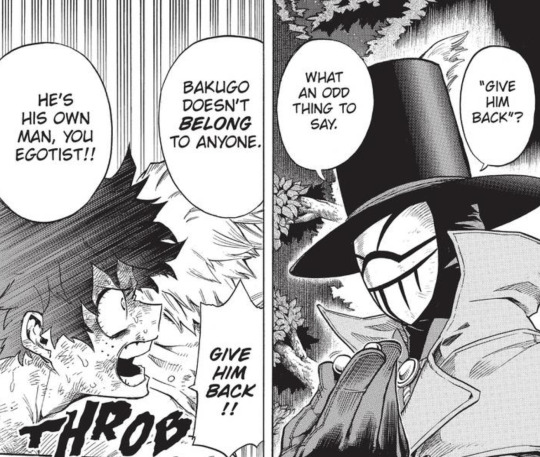
Note: There's a serious bit of nuance we're missing from the English translation though I'm having a hard time finding the original post I liked many moons ago that essentially goes into the fact that, when Midoriya told Compress to "Give him back," referring to the Bakugo marble... he used language that had a possessive connotation. 👀 In fact, even with the English translation, we can see that Compress specifically calls out the phrasing to be odd, we just miss the subtlety of why that is (they really don't want us to be great). Compress nobly shoots back that Bakugo doesn't belong to anyone but this violent idea of possessing someone... DOES THIS SOUND FAMILIAR TO ANYONE??
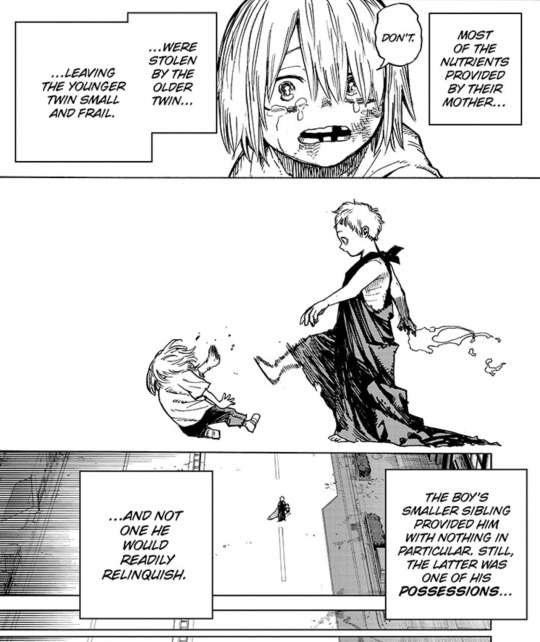

We have seen, scattered throughout this entire story, that All For One has always been obsessed with recapturing the One For All quirk. It's why he targets the successors so compulsively. I assumed it was because, as the dynamic had been cast, that One For All has always had the power to best All For One. It wasn't until we saw the vestiges locked within OFA, Yoichi in particular, that we realize there's a bit more to the story. AFO's origin story in chapter 407 casts a really interesting foreshadow.
This alone isn't particularly damning or why I think it has impact on the story's end, or at least not comprehensively. Now that we see All For One up close... we've gotten some insight into his disposition as well. Specifically, here:
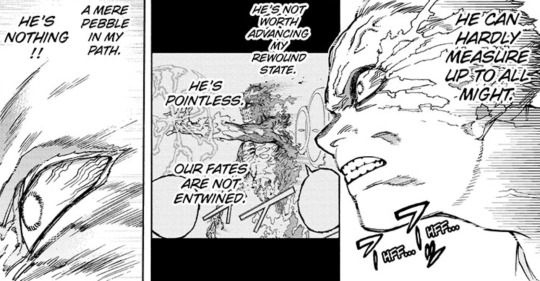
This mentality sounds exactly like...
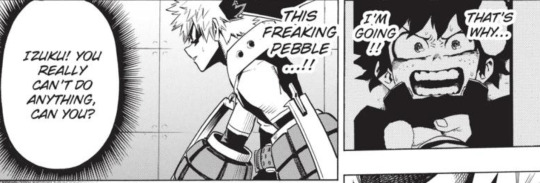
At the heart of the story, everything has centered around Midoriya and Bakugo and their quest for number one, as inspired by All Might.
Canonically, we know that, in universe, their adoration of All Might has led to an embodiment of a facet of what they believe makes him a good hero. The Win to Save vs. Save to Win camps that are defined most readily at Ground Beta by All Might himself.
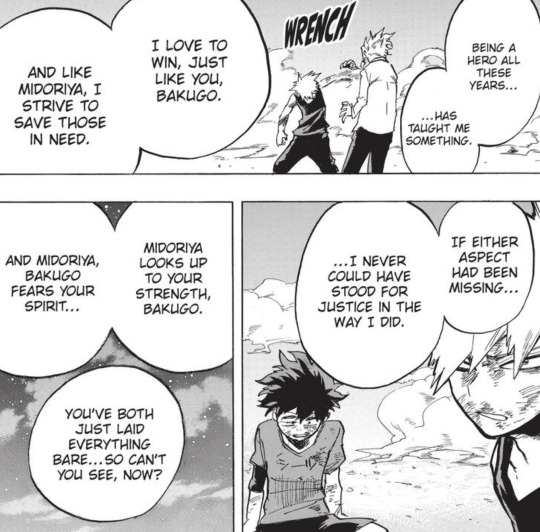
Midoriya and Bakugo are frequently cast as two halves of the same whole and as an impetus, not only for their mutually linked improvement, but also inspiring others around them to level up, as well. While it can be inferred that All Might as a mentor is largely the catalyst for this, it would be remiss to say that he doesn't have his own host of parallels but, at the center of this crack pot theory is his obvious relation to All For One.
To simplify where I'm going with this and explain the upcoming mental gymnastics: All For One is a foil for All Might.
We've seen Midoriya and Bakugo, in their quest to be heroes, embody two halves of who All Might is as a hero. In fact, Bakugo's reconciliation of his previous inability to "Save to Win" marked a major development in his character evolution and perception by people who aren't in Class 1A (Monoma. I'm talking about Monoma). On an unrelated note, members of Class 1A get to a point of not treating Bakugo like a ticking time bomb as they drag him around and infantilize him (Tsuyu) and this marked difference provided further exposition that the class has come to realize that he's mostly bravado and bluster and maybe not as awful as depicted at the onset of the story.
All that to say... given the parallels we see in the latest chapters. Are they meant to be two sides of All For One, too?
A continuing theme of the story (I'm sure I blab about it in other Manga With Me threads) is the fact that anyone can be a hero. However, there's also a critical examination of one's ability to be villainous regardless of intention or perception. We see it in the case of Endeavor, in particular, but also with characters like Hawks and Lady Nagant... and the Hero Commission, in general. Alternatively, even villains are redeemable or may have good intentions and we're seeing a lot of their redemptions play out through the duration of this war.
If we've seen the resolution of their embodiment of All Might, does it make sense to cast Midoriya and Bakugo in the shadow of who All For One is, as well? Arrogant, possessive, merciless and with an ego that looks only to subjugate others.
I think what causes unease about these panels and their comparison to AFO is because I'm expecting a huge cop out. We've been getting a lot of damning BKDK moments with an extra serving of Togachako. Would this new parallel cast them more in a brotherly light? With these parallel's and All For One's defeat... what does this mean for BakuDeku?
I think we've seen Bakugo overcome his likeness to AFO, as it were. Despite their competition, he recognized why he couldn't face Midoriya's spirit so, instead he rejected him. He reveals as much to All Might directly. Midoriya is no longer just a pebble and, based on vestigal Bakugo, I think we can all agree they are linked by something akin to fate. In fact, Bakugo was only able to save All Might (and balance out his guilt for "ruining" All Might while pulling off an All Might signature fist of triumph) with Midoriya's help and their wordless collaboration. He even grabbed his hand!
But the object of AFO's obsession is his brother and I can't help but also draw the connection between Bakugo's previous inability to reach out and accept Midoriya's hand back at the pond where Yoichi willingly grasped Kudou's (... pre-Bakugo, Bakugo) and escaped his brother. The coincidence is too much and I can't help but look for meaning in how this story seems to be coming full circle. Because, on the one hand I want to compare them to AFO but on the other hand, is the better comparison between AFO and OFA themselves?
In the latest chapter, we've seen that Shigaraki has robbed Midoriya of at least one OFA vestige and subsequently their inherent quirk. Will it all end by him losing each of them until he's back to being quirkless? A destruction of AFO seeing a destruction of OFA and ending this dispute of ideologies that's gone back several generations? Successful in besting Shigaraki but... losing someone who means so much to him in the process?
7/19 Edit to clarify, what I’m trying to say is: if the resolution to Bakugo’s hubris was reaching out a hand to a “pebble” to ultimately defeat AFO… would the resolution to Midoriya’s possessiveness be to lose everything?
It's too much to think about but I don't call it crack pot for nothing. I'm still formulating my hypothesis but think this next chapter should have something huge to explain how Deku is still able to avoid Shigaraki despite no longer being able to use Gearshift and losing Danger Sense. Maybe it'll be the linch pin in figuring out if there's a hypothesis to be had or whether this was all a big reach. I still can't decide.
#manga with me#manga with me mha#mha#bnha#my hero academia#boku no hero academia#deku and kacchan#bkdk#dkbk#ktdk#bakudeku#dekubaku#katsudeku#anime#manga#manga analysis#deku#kacchan#izuku midoriya#midoriya izuku#katsuki bakugo#bakugo katsuki#all might#toshinori yagi#yagi toshinori#all for one#afo#ofa#one for all#mha meta
45 notes
·
View notes
Text
What 70 years of AI on film can tell us about the human relationship with artificial intelligence
by Paula Murphy, Assistant Professor in the School of English at Dublin City University

In 2024, AI is making headlines daily. We may be aware of the science, but how do we imagine AI and our relationship to it both now and in the future? Fortunately, film may provide us with some insights.
Probably the best-known AI in film is HAL 9000 from Stanley Kubrick’s 2001: A Space Odyssey (1968). HAL is an artificially intelligent computer housed on board a spacecraft capable of interstellar travel. The film was released less than a year before humans landed on the moon. And yet, even in this optimism about a new era of space travel, HAL’s portrayal sounded a note of caution about artificial intelligence. His motivations are ambiguous, and he shows himself capable of turning against his human crew.
This 1960s classic demonstrates fears that are common throughout AI film history – that AIs cannot be trusted, that they will rebel against their human creators, and seek to overpower or overthrow us.
These fears are contextualised in different ways during different historical eras – in the 1950s they are associated with the cold war followed by the space race in the 1960s and 1970s. Then in the 1980s it was videogaming, and in the 1990s the internet. Despite these differing preoccupations, fear of AI remains remarkably consistent.
My latest research, which forms the backbone of my new book AI in the Movies, explores how “strong” or “human-level” AI is depicted in film. I examined more than 50 films to see how they shed light on human attitudes to AI – how we interpret it and understand it through characters and stories, and how attitudes have changed since AI’s beginnings.
youtube
Types of AIs
The idea of AI was born in 1956 at an American summer research project workshop at Dartmouth College in Hanover, New Hampshire, where a group of academics gathered to brainstorm ideas around “thinking machines”.
A mathematician called John McCarthy coined the name “artificial intelligence” and just as soon as the new scientific field had a name, filmmakers were already imagining a human-like AI and what our relationship with it might be. In the same year an AI, Robby the Robot, appeared in the film Forbidden Planet, and returned the following year in 1957 in the film The Invisible Boy to defeat another type of AI, this time an evil supercomputer.
The AI as malevolent computer appeared again in 1965 as Alpha 60, in the chilling dystopia of Jean-Luc Godard’s Alphaville, and then in 1968 with Kubrick’s memorable HAL in 2001: A Space Odyssey.
youtube
These early AI films set the template for what was to follow. There were AIs that had robot bodies and later robot bodies that looked human – the first of these appearing in Westworld in 1973, where a robot malfunction at a futuristic amusement park for adults creates chaos and terror. Then there were AIs that were digital like the evil Joshua in the 1977 horror Demon Seed, where a woman is impregnated by a supercomputer.
In the 1980s, digital AIs started to become connected to network computing – where computers “talked” to one another in an early incarnation of what would become the internet – like the one stumbled upon by Matthew Broderick’s high-school student in War Games (1983), who almost accidentally starts a nuclear conflict.
From the 1990s, an AI could move between digital and material realms. In Japanese animation Ghost in the Shell (1995), the Puppet Master exists in the ebb and flow of the internet, but can inhabit “shell” bodies. Agent Smith in The Matrix Revolutions (2003), takes over a human body and materialises in the real world. In Her (2013), the AI operating system Samantha eventually moves beyond matter, beyond the “stuff” of human existence, becoming a post-material being.
youtube
Mirrors, doubles and hybrids
In the first few decades of AI film, AI characters mirrored the human characters. In Collosus: The Forbin Project (1970), the AI supercomputer reflects and amplifies the inventor’s own arrogant overreaching ambition. In Terminator 2: Judgement Day (1991), Sarah Connor has become like the AI Skynet’s Terminators herself: her strength is her armour and she hunts to kill.
By the 2000s, human-AI doubles began to overlap and merge into each other. In Spielberg’s AI: Artificial Intelligence (2001), the AI “son” David looks just like a real boy, whereas the real son Martin comes home from hospital connected to tubes and wires that make him look like a cyborg.
In Ex Machina (2014), the human Caleb tests the AI robot Ava, but ends up questioning his own humanness, examining his eyeball for digital traces and cutting his skin to ensure that he bleeds.
In the past 25 years of AI film, the borders between human and AI, digital and material have become porous, emphasising the fluid and hybrid nature of AI creations. And in the films In The Machine (2013), Transcendence (2014) and Chappie (2015), the boundary between human and AI is eroded almost to the point of non-existence. These films present scenarios of transhumanism – in which humans can evolve beyond their current physical and mental constraints by harnessing the power of artificial intelligence to upload the human mind.
youtube
Although these stories are imaginary and their characters fictional, they vividly depict our fascinations and fears. We are afraid of artificial intelligence and that fear never goes away in film, although it has been questioned more in recent decades, and more positive portrayals can be observed, such as the little trash-collecting robot in WALL-E. But mostly we are afraid that they will become too powerful, and will seek to become our masters. Or we fear they may hiding among us, and that we might not recognise them.
But at times, too, we feel sympathy towards them: AI characters in films can be pitiful figures who wish to be accepted by humans but never will be. We are also jealous of them – of their intellectual capacity, their physical robustness and the fact that they do not experience human death.
Surrounding this fear and envy is a fascination with AIs that is present throughout film history – we see ourselves in AI creations and project our emotions onto them. At times enemies of humans, at times uncanny mirrors, and sometimes even human-AI hybrids, the past 70 years of films about AI demonstrate the inextricably intertwined nature of human-AI relationships.
#technology#artificial intelligence#science fiction#movies#science#robots#futurism#AI#2001 a space odyssey#Her#WarGames#Youtube
18 notes
·
View notes
Text
Something I've been thinking about a lot lately is the importance that mechanics and external factors have in understanding actual play, but how it's also really important to understand that the instant one leaves actual play as a medium, even if you are adapting the same story, you need to leave that behind.
I think the easiest example would be Scanlan's 9th level Counterspell. In the context of D&D 5e, we understand the following simply from the word "Nine": it is his highest spell slot; he only has one per day; and he has just expended an incredibly valuable and powerful resource that means he cannot use any spells that require it.
In an eventual adaptation, however, this is meaningless. That doesn't mean you can't depict something with a similar emotional weight and meaning; it's just that it will need to be portrayed differently (perhaps as an expendable scroll). The idea of "this is both very necessary to do and very powerful, and also is an immense trade-off" is what's important but the mechanics of it will necessarily fall away when you're no longer bound by mechanics. If you're adapting actual play or writing fic about it? You do need to have some degree of treating magic as a limited resource per day and staying true to broad abilities, but the idea of spell slots is "how can we provide limits to this storytelling system so that it is also a fun game" and the idea is that if you are looking at the story, and not the game, no one is saying "I have no more spell slots"; they're saying "I'm drained and need to rest before I can do more magic other than the most basic things."
(Note - this is fine in-game though. Like, yeah, ideally, no one would shout INSIGHT CHECK and would instead bring it up narratively but also...this is a dumb hill to die on, and I will die on a lot of hills. It is in fact fine while playing the game to acknowledge that you have spell slots and would like to make an investigation check instead of saying "I can do...some magic but not a lot, and I look more closely at the carvings on the wall.")
I think what also trips people up is that DMs in combat are limited by the rules of combat, but outside of combat, they really aren't. To give an example here, Ludinus casts a spell on Kadija that isn't clearly Feeblemind - she clearly has been reverted to the mindset of a young child or similar, but mechanically doesn't act as though she is INT 1, CHA 1. It has similar vibes but isn't quite the same.
This is totally fine and only the most stick-up-their ass pedant would fuss about it. It's a homebrew spell. It's a magical effect for a monster stat block. It is completely okay that it's not exactly a match for a spell that exists. The point is that it fits the broad logic of how magical effects work in the world (a targeted save that she fails; curable) and furthers the story. (Another example is Caleb's backstory re: Vergesson, or Veth being turned into a goblin; ultimately, it doesn't matter exactly what happened as long as we get the gist, because they both fit into, for lack of a better term, the vibe of the magic).
One last related thing is that metagaming in the sense of like, actively trying to twist the scenario to your advantage based on information you as a player know and your character would not is bad (eg: if you know a certain monster is vulnerable to a certain damage type but your character has never encountered it, and you use something extremely atypical for you to leverage this? not great); but I also think fear of metagaming kind of goes too far at times, and stepping back and remembering this is a narrative and not just a rule set helps here. To give an example here: Fearne and FCG hadn't met Caleb and Beau, but as eventually was actually discussed at the table, they still do know that Ludinus and Otohan = bad guys and so it's valid to say "hmmm, freeing their prisoners is like, not a bad idea if only for the chaos." Your character might not know the characters in-game, and they certainly don't know them out of game, but I think a lot of people overcorrect and you don't need to.
This is tbh another case in which I would recommend D&D Court from NADDPod, because they do handle a lot of metagaming-related cases where people are getting far too obsessive. The fact is there is a lot of metagaming happening anyway. If your players seem upset you stop even if the characters wouldn't likely be upset. The famous Sam Smorkel joke works specifically because, on some level, no normal person would speak to Sam Smorkel first, and your players are doing it because they have medium awareness. Metagaming is constant, perfect immersion is rare, and keep an eye out for it but usually metagaming that does cross the line is pretty egregious and the rest is overly concerned.
#long post#cr tag#i also have a separate thought on like. external factors a la ashley being absent and such#but honestly that shit isn't d&d specific and on some level when people are like SEEMS LIKE A COINCIDENCE#It's like. yes this is how fiction works. there are premises on which it rests that might seem far-fetched. can you understand this.
103 notes
·
View notes
Text
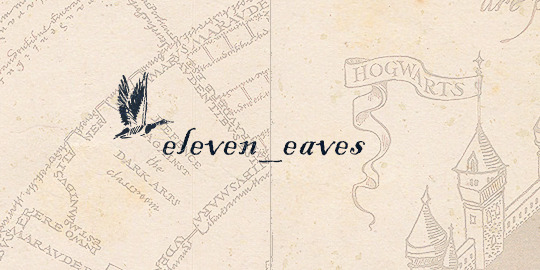
Cindle (@cindle-writes) is someone I cannot say enough lovely things about! I want to give a special thank you to Cindle for all of her amazing Mutuals March posts with this shoutout dedicated especially to her. 💜
I think it's safe to say Cindle has quickly established herself as a pillar of the Tomarrymort community, whether it be to cheerlead, beta, or simply enable those in our little corner of fandom. Not only that, Cindle consistently writes some of the most amazing fics in a wide range of characters, ships, and tropes -- providing us with delicious smut that often includes an amazing plot twist as the cherry on top!
Long story short, Cindle never ceases to amaze me with her dedication to this fandom, both as a talented author and a supportive friend. Her enthusiasm makes this space a better one!
Cindle, thank you for all that you do! We appreciate you so very much. 💜🛐 To celebrate you, here are a few favourite works of yours chosen by some of your friends!

☪ complete (Tom / Harry) E | 8.7k | Complete | Underage
Everything about this fic is perfect! There are so many yummy angst pieces of young Tom’s sad orphan backstory that are reflected in his (manipulative) interactions with Harry, and it meshes so beautifully with Harry's initial polite treatment of him as they get to know each other. Of course, the 'strangers' aspect speedruns right into 'lovers' once Harry realizes his newly-adopted baby Dark Lord is actually an omega. The ensuing smut is 👏🏼🥵🔥💯😈 !! I go absolutely feral for this dynamic and this fic delivers on every count.

☪ dawn of a death of a dream (Tom / Harry) E | 53.8k | On-Going | No Archive Warnings Apply
This story demonstrates just how patient a young Tom Riddle was when it came to achieving his goals, and I just love how even with Harry being so certain Tom manages to capture him in his own messy web. We get mind games between enemies who often forget they are enemies, and allow their positive feelings for each other to shine through in a bid to trap the other using their intimate relationship. So fun & silly & WAIT WHAT?? 💜💜💜 ( this blurb written by Apples! 🍎)

☪ Everything Green Is Gold (Tom / Harry) E | 21.3k | On-Going | Underage
BABY HARRY BELOVED! Professor Riddle takes first year Harry under his wing and teaches him sooo many things 😏🍆. Cindle really outdid herself on this story -- Tom is super manipulative with everything he does, but he is also so attentive with Harry in the process that even though we know what's happening, we're liable to... forget. Just a little 🤏. A million kudos for such a hot and realistic depiction 🔥!!

☪ in bad faith (Voldemort / Harry, Cedric / Harry) E | 2.9k | Complete | Non-Con, Underage
This fic builds on an already fantastic premise -- an AU of GoF where Voldemort captures Cedric (and Harry!) -- and expands it to include even more angst! The smut is delicious and the plot twist at the end had me going insane. Without spoiling too much, I will say I love the aspects of the original dynamic surrounding Cedric, Harry, and Voldemort that are incorporated into this glorious mindfuck continuation.

☪ i’ve missed you, my boy (Tom / Harry) E | 1.9k | Complete | Underage
One of the BEST plot twists I have ever read! Harry’s complex relationship with Voldemort is done so well in this post-war AU. I don’t want to spoil anything, but the reread value of this fic is incredible -- in the brief span of a few thousand words, we get so much character insight and build up to a truly incredible reveal. It is a delight going back and picking out all the details that lends to just how deeply messed up and multilayered this relationship is!

☪ last rites (Scarcrux / Harry) E | 5.1k | Complete | Major Character Death
Such a HOT fic. Scarcrux knows all of Harry's deepest, darkest secrets -- including just how he likes to get off. Watching Harry's resistance crumble in the face of Tom's careful seduction is one of my favourite dynamics in this ship! And BOTTOM TOM is the whipped cream hat on this perfect PWP parfait. 💜🔥 We deserve more fics like this one, where Tom gets what he wants!

☪ the dark passenger (Al / Harry, Tom / Harry) E | 5k | Complete | Non-Con, Underage
Cindle's next-gen writing is a huge part of why I have any interest at all in those characters, and this story is a great example of why! In this fic, we navigate Al's co-dependent relationship with Harry as his loving father and (though he doesn't know it!) his fated enemy. The merging of Al and Tom's personalities is so well done and elevates both ship aspects of the story, as well as seeing Harry through the lens of Al-with-Tom, in such a unique way!
108 notes
·
View notes
Note
hi! i didnt have much success when looking through ur blog to see if uve addressed this alrdy so apologies if u have.
i was curious to know ur thoughts on jjk's portrayals of gender, esp women/femininity. if u have particular insight from a psych or philosophy bg, id be interested in hearing that (warning, i have a v feminist critique lens)
ik u love gege's writing 😅 but his handle on female characters/femininity has given me such a difficult relationship w jjk, and its v difficult to have discourse on it. on one hand, we're introduced to sm interesting realistic women, tbh i actually never stanned a woman in manga before jjk. but imo it cant be denied that gege is a sexist writer. despite how realistic jjk women r theyre all .. halfwritten? i cant think of a single one who isnt underwritten, not fully explored, not utilized substantially in the plot, etc. and there r sm ex's of extremely minor male characters in jjk who r given more thematic relevance than frequently recurring women that just underscores that gender gap imo
this isnt solely a gege problem ik but what bothers me in particular about jjk vs other mangas is how gege addresses strength, even in the light of nb/androgynous characters, and how it feels as if gege's def of strength is inherently masculine? even despite going so far as to give us a philosophical battle shonen w diverse reps of gender and emphasizing individuality that encompasses both femme/masc traits
how a reader interprets whether a jjk woman is strong or not is obv subjective. like, i think shoko is strong but shes not depicted as such bc she doesnt have a combative technique whereas yuki maki nobara or mei r depicted as "strong" bc of their battle abilities. but it also feels as if those women r strong bc they take on "masculine" traits/mindsets whereas there r no clear depictions of "femininity" making women or men stronger. even utahime who falls into v classic shoujo girl tropes is seen as weak despite teaching her students v proficientally in battle strategy (mechamaru v mahito is a good ex of that imo), as compared to how gojo teaches his (ie dumping them into missions for experience). but thats not what gege ever chooses to highlight
femininity also doesnt even seem to make men/nb characters stronger. the ex's i can think of r naoya as a vagina (lmao), geto as a mother to curses, yuta as highly attuned to his emotions, kenjaku as yuji's mother -- those r things that support these (mostly) men's strong sense of individuality but like, those arent really the things that lend those characters their "strength", u know? like geges just sprinkling in androgyny for the spice 🧐
what is feminine vs masculine, how an individual embodies those traits in their gender identity r already complex topics. im obv generalizing a lot here, but i just, idk despite how many other nuanced philosophies gege explores, what is strong/desirable in jjk still falls down to all-out fighting abilities/physical prowess, emotional detachment, isolation, extremism, etc -- all things we harp on toxic masculinity for. and even when he critiques that, theres no cogent counter solution/way to be strong that gege provides, much less one that incorporates "femininity" and women
maybe im just asking for too much from gege after having read so many great representations of women and gender by female (and male) mangakas/writers but.. i shouldnt be 🙄 he can utilize his female characters more imo, esp when he can clearly set them up so well. and im sure theres things ive misread about jjk and its portrayal of femininity, theres plenty of holes in my thoughts ^^ anyways, this is obv not a great topic to bring up in a fandom that is so polarized between dudebros and women w unaddressed internalized misogyny.. so i welcome any and all thoughts and interpretations on ur end! (also omg im rlly sorry this got so long)
I love you feminist anon, if I may call you that lol, I just always name my anons 😂. I am so grateful that you sent this.
I feel like you've very eloquently explained the deeper reason as to why I personally can't relate to the female characters in jjk. If I'm honest, I like them and think they are fun and good enough representations or attempts at depicting the archetypes that rule their personalities.
As you say, however, some of them remain rather superficial and underutilized... and please forgive me anyone who loves them, but some of them feel like they are basically dudes wearing skirts.
No offense to dudes who wear skirts or people who like men who wear skirts or anyone for that matter. It's just that, as a personal preference, I like female characters that wear skirts, pants, leggings, etc and have equal amounts of masculine and feminine energy.
So, even if I find they are good enough, I've never necessarily loved jjk female characters, because, as you also say, I've read/seen one too many amazing and iconic female characters by other authors...
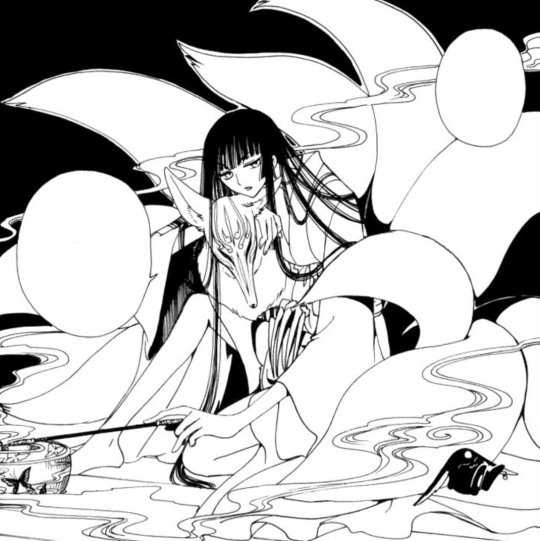
And it's not like I think you're asking for too much from Gege in wanting better female characters, it's just that, as you also said, I like his writing and I read jjk precisely because of what it's doing for my masculine psyche. Like... quite literally.

So perhaps I'm more forgiving than you are because of it? Because in all reality, there are female character moments in other manga that I have to give the bombastic side eye to, and jjk isn't one of them.
Let's taco'bout it more under the cut.
So, that said, I have to admit that you might not find a lot of "feminist oriented" content in my blog because my feminist lens is reserved for dealing with lame dudebros in my real life, and also, I honestly do not know how to wear the lens on the same level of depth as you do.
Also, since my blog's lens is depth psych, I very much focus on femininity and masculinity as psychological qualities that exist on opposite ends of a continuum regardless of biological gender. You'll see me refer to femininity and masculinity like this throughout my answer.
So because of this, I'm coming at the whole issue from a slightly different angle than you are. The way I see it, I think the way the jjk female characters are written and thematically utilized (basically everything you said), ultimately comes back to how Gege's exploration of femininity is limited by his own sense of self, and very much likely biased by the sociocultural landscape he grew up in.
I don't know how much you know about Japan, but Japan has one foot in the future, and one foot in the past...
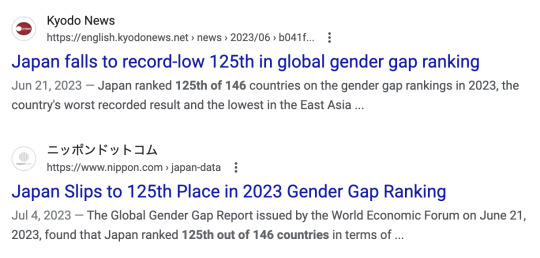
And like... ok I'm totally oversimplifying the whole thing. All I'm saying is... Gege is a man who grew up in a man's world, sharing his view of the world through jjk, which is a story about initiation of the male psyche that is published in a magazine for young boys.
Do you see the pattern there?
So If you feel like his female characters are underutilized and underexplored, and that thematically jjk focuses way too much on masculinity and masculine definitions of strength at the expense of the feminine archetypes he does present (like Naoya as a vagina LOOOOOOOOOOOOOOOOOOOOOOOOOOOOOOOOOOOOL)... well... to me, we're basically looking at the limits of his own relationship to his femininity, which, this relationship is in turn an imperative precursor for psychospiritual development in depth psych. More of this in a bit.
Anyways, that's my anticlimactic reasoning for why I am more forgiving about the issue than you are. To be honest, I've been so consumed exploring my masculine psyche through jjk (because personally my feminine psyche is more developed in certain aspects) that I just never focus on the female characters (that is not to mention what I shared earlier).
ANYWAYS, I fucking love what you wrote about Gege's exploration on power from a masculine perspective because you're 100% spot on. What I'll say to that is that, to me, from a depth psych perspective, that's kind of the whole point.
I invite you to look at it from this other level of perspective (in addition to the whole "Gege's psych is a product of his upbringing"): the whole idea of individuality and focusing on the sense of self as a measure of "The Strongest" is being shown as an incomplete part of the equation...
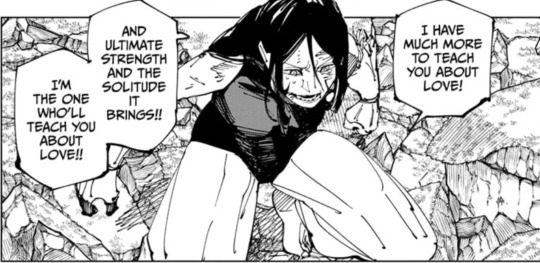
... that leaves "the strongest" ultimately feeling dissatisfied.
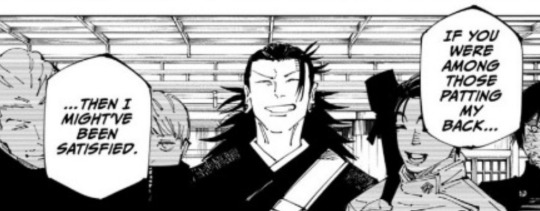
This is a sentiment echoed by several characters because ego strength (masculine definitions of strength) is ultimately an unbalanced measure of strength precisely because it ignores feminine values and measures of strength.
Who knows where Gege is taking jjk at this point, but I will admit I am hoping he is going to explore this in more depth because, central to Jungian thought and depth psych is the idea of the Buddhist middle path and union of opposites.
In Jungian psych this means that, when you have an unbalanced ego attitude like that, something has to give so that the pendulum swings in the opposite direction, which gives the ego the experiences it needs to integrate the "opposite" attitude. This ultimately results in a more holistic and balanced perspective for the ego.

That to say that I'm wondering if Gege is going to make the pendulum swing in the opposite direction with the whole "individuality" idea since self-preservation is a "masculine" trait. Again, psychologically, it's all about balance, and right now, the story is out of balance in favor of the masculine traits you mention.
But... to bring it back to Gege's possible limitations around his perception of femininity and how developing a healthy relationship to his anima (femininity) is a precursor for psychospiritual development... what if, on a meta level, jjk is depicting part of Gege's journey towards integrating and deepening his relationship to his femininity and what you're seeing is the beginning of that journey?
Hint hint Tsumiki! maybe I'll write about it someday
This is the thing... In depth psychology, more specifically what is called "the psychology of fairy tales", fairy tales and myths are stories that depict the thinking patterns of a peoples through metaphor and symbol. The characters in these myths and stories are thus characters playing out dramas in our own psyches. So basically, think of jjk as an objective exploration of Gege's subjectiveness (psyche).
Admittedly, even if the pendulum swings in the other direction (more feminine definitions of strength), you might find that his exploration is rather shallow or that it falls short of your expectations for what you'd like to see from a feminist perspective. And you wouldn't be wrong for it, it's just that Gege is probably not on the same level of understanding that you have about femininity because he's, like you and I, a human on a journey of self understanding and growth reflecting on how his environment has shaped who he is.
The same goes for women with internalized misogyny. Sometimes you don't know what you don't know, and coming to an understanding of it is a process that doesn't take place overnight.
So I think the only part I'll disagree with is that Gege is a sexist writer. But that's perhaps because I'm being a bit too technical in what sexist means? i.e. masc supremacy or hating women and perpetuating stereotypes. I think that rather than being sexist, his unconscious biases are showing, which is why someone like you can pick them out.
I do understand where you're coming from though, and admittedly perhaps I am being too forgiving of him.
Last thing I'll say is that I've said a couple of times that wanting for jjk to have these iconic female characters feels like an exercise in futility. In retrospect, I now understand that it's not that anyone shouldn't want for jjk to have iconic female characters, but that doesn't change the fact that jjk will probably remain the wrong manga to look for them, and that's something to make peace with because it is what it is.
So, here's to hoping we get a chance to see a deeper representation of feminine values in jjk or Gege's next manga. Because, if he's done such beautiful work with the masculine psyche, like you, I'd be curious to see what he makes of a deeper exploration of the feminine psyche.
Between you and I, I'd actually love reading a proper battle bl from Gege. And I mean proper. Like... gays so canon that even the dudebros can't deny it.

ANYWAYS... giiiiiiiirl what an ask 😮💨. I don't think I've done it justice tbh. But hopefully I made sense? I really do love what you wrote. It was very eye opening to see this age-old argument spelled out the way you did it. So thank you again for sharing your thoughts!
If you over have any other thoughts on the topic I look forward to hearing from you!
I rambled too so... hopefully I made sense 🤣.
17 notes
·
View notes
Text





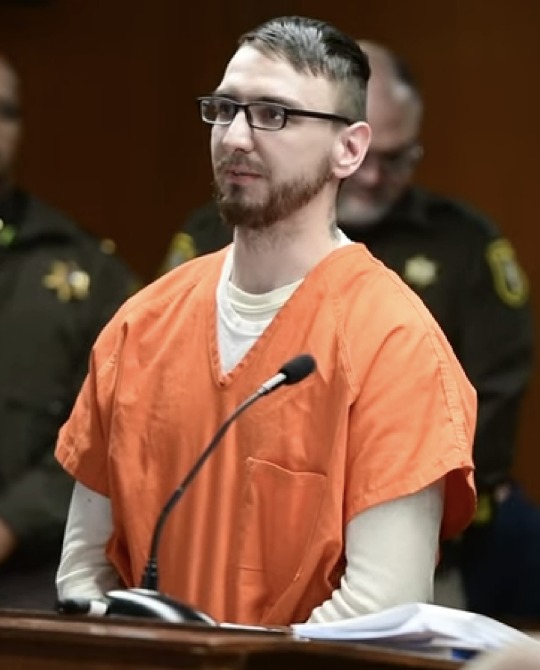
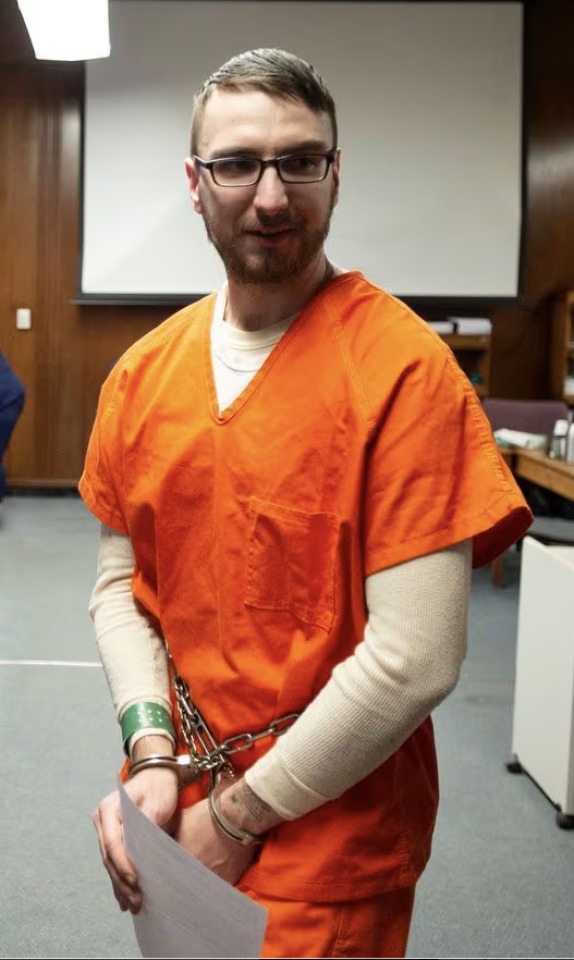

Post 1151
Paul Edward Bellar, Michigan inmate 735434, Federal inmate 02759-122, born 1998, incarceration intake December 2022 at age 25, earliest release date September 2029, full release September 2044
Gang Membersbip, Providing Material Support in a Terrorist Act, Use of a Weapon to Commit a Felony
In December 2023, a trio of men were sentenced to spend several years behind bars on charges stemming from a plot to kidnap Michigan Gov. Gretchen Whitmer.
Paul Bellar, along with Joseph Morrison (Michigan inmate 735421), Pete Musico (Michigan inmate 735428), were each sentenced to spend at least seven years in prison by Jackson County Circuit Judge Thomas Wilson in a lengthy sentencing hearing Thursday, Dec. 15.
Musico was the first man to be sentenced, with Wilson passing down a minimum prison term of 12 years.
Musico pleaded with Wilson to show him mercy before he was sentenced, claiming both he and his wife suffer from health issues that could possibly endanger them if he were to receive a harsh sentence.
“The time in my life that this all took place in, there was a lot of emotions going on throughout the entire country, on both political sides,” Musico said. “I had a lapse in judgement; I’ve been a good citizen, I’ve been a family man -- I’ve taken care of my family for a very long time.”
Wilson did not show sympathy in sentencing Musico, saying previous testimony depicting the defendant berating and threatening to kill a Michigan State Police trooper he encountered at a protest provided an insightful look into his thought process and character.
A woman sitting in the back of the crowded courtroom began to cry as soon as Wilson read Musico’s sentence. Musico himself cried as he was led out of the room in chains.
Morrison was sentenced second. Wilson sentenced the 28-year-old to spend at least 10 years in prison.
Speaking before the court, Morrison renounced his affiliation with the “boogaloo” -- the term used to identify a far-right, domestic terrorist movement centered on plans for a second American Civil War -- and all other similar extremist ideologies he once believed in.
“I sincerely regret ever allowing myself to have any affiliation with people that had those kind of ideas,” Morrison said. “I regret that I ever let hate, fear and anger into my heart the way I did.”
Before he was sentenced, Bellar apologized to Whitmer for his “highly inappropriate” past comments, claiming they don’t represent his true character. Bellar also addressed his family and friends that had filled the courtroom behind him, apologizing and thanking them for their support.
“I love all of you -- I’m so sorry, I wish I would have grown up faster,” Bellar said, his voice beginning to waver as he held back tears. “I’ll see you guys when this is all over.”
“You’re always welcome home,” a man in the audience said to Bellar as the defendant turned back around to face hear his sentence.
Bellar received the most lenient sentence of the three men. Wilson sentenced the 24-year-old to spend 7-20 years in prison. His sentences are to be served concurrently, while Musico and Morrison are to serve their sentences consecutively.
Bellar embraced his attorney Andrew Kirkpatrick after his sentence was delivered, with Bellar fighting back sobs as court officers began to take him away.
4f
15 notes
·
View notes
Text
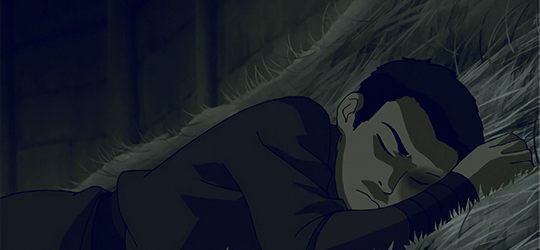
ATLA is practically a foundational text on contemporary depictions of found families and romantic notions of friendship and platonic love (alongside Hanya Yanagihara’s A Little Life). This may just be my contrarian side resisting the abundance of ‘web weaving’ and quote collections and even the pop-therapy recommendations about the importance of ✨friendship✨, but I think atla also makes room for ideas that are less obsessed and dependent on finding your person or your people. In fact, I think the series depicts loneliness, alienation, and solitude as essential features to a healthy understanding of life.
The entire gaang emerges into the series in a state of loss—lost freedom, lost parents, lost inheritance, lost civilizations. The absent things give their lives shape, and imagining the recuperation of what they’ve lost, rather than inspiring hope, is what inspires some of their darkest moments. Aang hurls sparks toward Katara when he demands a reason for the monks decision to ship him away from Gyatso (which subsequently led to his fateful fleeing from the temple); Katara is forced to bloodbend when she finally finds a southern water bender like her mother to teach her; and Zuko spends the first two and a half seasons in aggression and self-hatred as he pursues the family and nation that he’s been denied. Painful expressions of grief like these occur when the characters seek out alternative propositions to feelings of emptiness, feelings of emptiness that have been left for them by failed expectations and fragile impermanent lives. The show encourages us to fear those who grasp for straws of what was to defend against their own loneliness.
Despite the trope of a found friend group as a protective resource of “healing” which pervades fanart and fanfics for atla, the show presents few instances where actual wisdom is found within the peace of friendship or family. Found families seem to be stabilizing but not inspiring. Run-ins with acquaintances (think: Iroh’s encounters with Aang or Toph, or Aang and Zuko in the Blue Spirit episode) are more likely to be catalysts for transformation, and arguments--not acceptance--between contentious factions within the friend group provide the fertile soil for growth. In both of these kinds of instances, the show puts in an effort to depict individuals seeking out time away from the group to be by themselves: the key ingredient for metamorphosis, whether that solitude allows for a character to hear people’s perspectives from safer distances (Katara swimming underneath the rock while Toph and Sokaa talk in The Runaway), for the full pain and grief to set in (Aang in The Awakening), or for a character to experience a unique encounter with an acquaintance (the aforementioned chat between Toph and Iroh in The Runaway).
In fact, whole episodes are devoted to characters going it alone. Aang’s disappearance from the world entirely in the four-part finale in an attempt to find the insight he needs to face the Firelord is the most thematically relevant example from the series and Zuko Alone is probably the most acclaimed. Within the philosophy of the show and its contemplative and Eastern inspirations, being on your own is something to be made fruitful because its our existential state of being. Its the site where you can accept the constant change that’s going on all around and within you, so that you can nurture the present realities that are being given to you, for the time being, making something enjoyable out of life as it stands. It doesn’t replace or heal the loss of the old beautiful days. It’s another thing that will pass. Then you’ll find yourself alone again, preparing to grieve, and then move on to the next set of fleeting dear things.
23 notes
·
View notes
Text
Hamlet Literary Analysis
Act 1, scene 5.
In this scene, Hamlet is alone on the battlements at Elsinore when his father's ghost appears to him. The ghost reveals that he was murdered by Hamlet's uncle Claudius and that Claudius is the current king. The ghost urges Hamlet to avenge his death. The moment is significant because it marks the point where Hamlet’s sense of duty and desire for revenge is solidified. The appearance of the ghost forces Hamlet to confront the corruption and betrayal in his family and court.
Key Themes
Revenge and Justice: The appearance of the ghost sets in motion Hamlet's quest for vengeance. The ghost speaks of a "most foul, strange, and unnatural" murder, and Hamlet is now burdened with the task of avenging his father’s death. The theme of revenge becomes central to the play, and Hamlet’s moral questioning of this obligation shapes his actions (and inaction) throughout the rest of the play.
Corruption and Deception: The ghost’s revelation exposes the moral rot at the heart of Denmark’s monarchy. Claudius’ betrayal—murdering his brother to claim the throne—sets the tone for the political and personal corruption that permeates the play. The ghost also describes the anguish of being murdered in his sleep, which underscores the treachery of the act.
Language and Literary Devices
Rhetorical Questions and Imperatives: Shakespeare uses rhetorical questions and imperatives to highlight Hamlet’s confusion and emotional turmoil. For example, Hamlet's repeated questioning of the ghost's intentions “What should I do?” and the ghost’s command to “Remember me” create a sense of urgency, but also confusion.
Structure and Rhythm
Shakespeare uses blank verse (unrhymed iambic pentameter) in this scene, particularly in Hamlet’s soliloquies. This verse form allows Hamlet to express his emotions with a sense of rhythm and order, even though his thoughts are chaotic.
Staging and Interpretation
I chose this scene because it marks the turning point in the play where Hamlet is thrust into his role as an avenger. It provides insight into Hamlet's emotional state and sets the stage for his future indecision and internal conflict. Additionally, it introduces the theme of the supernatural, which is vital throughout the play.
How the Scene is Brought to Life
The Ghost's Appearance: In many interpretations, the ghost is depicted as a spectral figure that moves in and out of the shadows, creating a sense of mystery and danger. The ghost’s appearance could be eerie and unsettling, with a voice that evokes both authority (as the former king) and a sense of suffering (as a murdered spirit).
Actor’s Performance as Hamlet: The actor playing Hamlet in this scene often portrays a sense of disbelief and fear initially before shifting to a deep sense of rage and urgency as he listens to the ghost’s revelations. Hamlet’s reaction moves quickly from uncertainty to determination. The actor may use body language such as pacing, shaking, or even falling to his knees to express Hamlet’s emotional turmoil.
Characterization of Hamlet
In terms of interpretation, this scene reveals Hamlet’s complexity as a character. In some productions, Hamlet is portrayed as a tortured, almost insane figure from the start, consumed by grief and rage. In others, he appears more rational, but increasingly conflicted as the weight of his father’s demand for revenge becomes clear. Hamlet’s quick shift from disbelief to resolve is often portrayed through facial expressions and posture, illustrating his internal conflict between duty (to avenge his father) and his deeper moral hesitation.
Interpretation of the Ghost
The ghost’s role can also vary depending on the director’s vision. Some portray the ghost as a benign, almost pitiable figure, while others emphasize its ominous, commanding nature. The ghost is not just a messenger of vengeance—it also serves as a catalyst for Hamlet’s internal disintegration, highlighting the psychological toll that the revelation of his father’s murder will take on him.
0 notes
Text
Entry #2: Film
For the film portion of my journal, I chose to examine the 2018 Marvel movie "Spider-Man: Into the Spider-Verse." It's an animated film that explores the concept of the multiverse, where multiple dimensions and alternate realities coexist. The story centers on Miles Morales, a teenager who gains spider-like superpowers and becomes the Spider-Man of his universe. When a super-collider causes various Spider-People from different dimensions to converge in Miles' world, he must team up with these alternate Spider-Heroes to stop a catastrophic threat and find a way to return them to their respective realities.

When looking at our class topics, "Spider-Man: Into the Spider-Verse" is closely linked to our content regarding multiculturalism and the Hapa Project. This film makes a point to represent diverse identities and experiences throughout the characters in the cast. In particular, it celebrates cultural diversity through its various Spider-People, who come from different backgrounds, such as African-American, Hispanic, and Japanese. Each character brings a unique cultural perspective to the story, reflecting the idea that heroism and personal identity are multifaceted and inclusive. The movie highlights the richness of different cultures and how they contribute to a broader, shared experience. When looking at The Hapa Project, it focuses on the experiences of individuals who are of mixed Asian and Pacific Islander heritage, often exploring themes of identity, belonging, and representation. Miles Morales is of African-American and Puerto Rican descent, embodying a similar sense of mixed cultural identity. His character resonates with the Hapa Project's themes by showcasing how mixed heritage individuals navigate their identities and connect with various cultural influences.

This film also elaborates on racial and ethnic identities beyond the appearance of each character. First, the film juxtaposes culturally specific elements with universal themes. For instance, the depiction of Miles' family life includes cultural references like his father’s role as a police officer, his mother’s protective nature, and the importance of family ties and community. These specifics provide insight into his background while emphasizing universal experiences of family dynamics, adolescence, and self-discovery. Second, the film’s animation style reflects diverse artistic influences, from graffiti and street art associated with urban culture to the more traditional comic book aesthetics. This visual diversity mirrors the variety of cultural backgrounds represented in the characters, making the film a celebration of both cultural and artistic diversity. Lastly, the interactions between characters from different dimensions foster conversations about cultural and generational differences. For example, the older Spider-Man (Peter B. Parker) has to mentor the younger Miles, bridging generational gaps while also navigating cultural nuances. These dynamics can prompt discussions about mentorship, cultural transmission, and the evolving nature of identity.
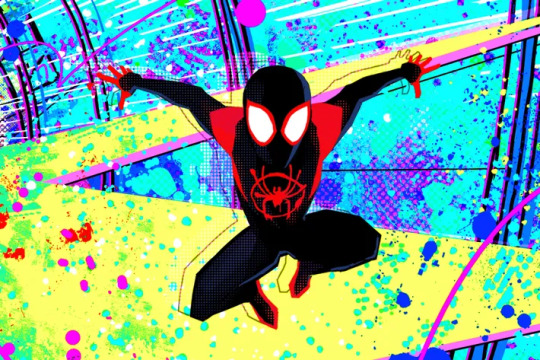
All in all, "Spider-Man: Into the Spider-Verse" is a champion for cultural representation in the film industry, and its story reminds us that while our backgrounds shape our experiences, the essence of heroism and personal growth is something that transcends individual differences.

Works Cited
https://kipfulbeck.com/hapa-me/

https://www.forbes.com/sites/insertcoin/2018/12/16/spider-man-into-the-spider-verse-is-not-just-a-must-see-its-a-must-see-in-theaters/

https://www.imdb.com/title/tt4633694/

https://www.netflix.com/tw-en/title/81002747
https://www.vulture.com/2019/01/how-spider-man-into-the-spider-verse-changed-animation.html

Kip Fulbeck, "The Hapa Project: 10 Years After" (2013)
Susan Saulny, "Black? White? Asian? More Young Americans Choose All of the Above" (2011)
0 notes
Text
To start looking into chapter 4 of Saezuru Tori wa Habatakanai we take the physical tankōbon: it is at the very start of volume 2, I’d like to show you the cover and and open it, turning the first color pages of it, Doumeki in his blue police uniform. Now let’s look at both the first and the second volume for a moment. A thing I dislike about many cover illustrations of romance themed books is that they frequently showcase the main pairing and sometimes one of them, if not both, will look at you like it is a photo-shot from a fashion magazine. Don’t look at me please, I am here to intrude unseen in your most intimate moments and you aren’t supposed to know. Characters looking back at you makes your position as a voyeur more obvious. It makes me self conscious, I don’t want to be in the story, I want to immerse myself and disappear while others take the stage.

Yashiro looking back at us in the cover of volume 1 is calling us out, but also offering himself willingly: in the first part of the story he is both a voyeur himself (with Kuga and Kageyama) and an exhibitionist (reprimanding and acknowledging Nanahara for spying on and later having Doumeki openly looking at his sexual activities). He often flaunts his sensuality and sexual desires; he lets others look at his sexual encounters that aren’t in any way related to sharing intimacy, only performance and gratification. The cover of the first tankōbon is an incredibly eloquent portrait of Yashiro, a powerful introduction to the story. His vulnerability coexists with the empowerment of the submissive role when the rules are laid out clearly in a BDSM scene. Now take volume 2, its cover illustration is strikingly different, and it remains quite unique at the moment: the majority of these covers are centered on the characters and sometimes the background disappear completely. In this case it is likely that you wouldn’t even notice the characters at first. It’s the city at night, the urban lights, the street wet with rain that is predominantly portrayed: the atmosphere, other people under their umbrellas, only looking carefully you see Yashiro waiting at the red light and then Doumeki following behind: they rain is falling on them, they don’t have an umbrella. This is likely the same scene depicted in chapter 7 and on the cover of the sixth tankōbon as well. Imagine me showing you the movie version, if this was a video. Try to smell the rain on the concrete, it’s so real. Look at the lights reflected in the various puddles. The focus is on the environment, we are zooming back to the city, away from the characters, not a fashion magazine photo-shot, but urban photography.


Volume 1 was done, the characters introduced, the setting established, the readership established as well. It contained the first three chapters, but also two other one-shots that provided further details and insight into Yashiro and Kageyama’s relationship and backstory. Doumeki and Aoi, Misumi and Hirata have been also introduced, the set up for the first part of the story is complete, we are invested. Chapter 3 ended with maybe the first moment that is not only sexually charged, but very emotionally charged as well, the first moment where sex happens when there is intimacy. Even when Yashiro asks for Doumeki to pull his hair harder, it’s probably the gesture of Doumeki reaching out to touch Yashiro tenderly that makes it different, makes it the moment Doumeki starts to wonder what if.
I have maintained a special interest and attachment to chapter 4 for a long time now. Although I was invested in the story, characters and style, chapter 4 really solidified for me the complexity of levels that Saezuru has, made me reassess my first impressions, made me wonder if I was trying to read too much into something that just wasn’t that deep, but no. That feeling of knowing “there is something there” wouldn’t go away. I wasn’t sure though so I just asked Georgie @itwearsadress back in February 2023 and I am very grateful for their very thoughtful answers. I will use their explanations on the terms and specific language Yashiro and Doumeki are using in their “scene”. And I am also grateful for Benvey’s observations about the same scene @nanayashi-agenda further confirming that I wasn’t imagining things, that it was possible to read something more into it.
I am going to quote parts of the exchange I had with Georgie, while also adding to it my updated analysis, now that I am a little more confident in my own understanding of things. So initially, I formulated my questions as follows. Yashiro dressed Doumeki up as a policeman and tried to role-play as the criminal and aggressor, aiming to be “arrested and punished” - while Doumeki instead wasn’t able to fully comprehend his part in the role-playing and act properly, taking Yashiro’s words literally and reading them through the actual law, refusing to acknowledge that Yashiro was infringing it or doing something that would require him - as a real policeman - to do something about it. Doumeki was being direct and literal all the time, while Yashiro was looking for an excuse to create a scene where Doumeki stopped him. Yashiro probably started randomly referring to potential charges that progressed to the topic of sexual misconduct, because he was leading the role-play towards a sexual scene. Besides the humor resulting from Doumeki’s straight face - while he doesn’t fully comprehend the assignment - that entire exchange ended with Yashiro being upset and truly angered and I was very dissatisfied with my comprehension of the dialogue. And here came George to my rescue. The number three works really well in storytelling, I have always considered the fact that Yashiro tries three times here as a deliberate choice. So he tries three different charges and for each one Doumeki replies. There is no crime. Yashiro can’t be recognized as the aggressor in Doumeki’s eyes, so as a policeman he doesn’t have to act. There is nothing there.

First. I am referring to the very first page of chapter 4, the one in color. Here’s George’s take:
Now to the particular point you mentioned - Yashiro wants to do some police/criminal role play so he starts riffing some random sexual crimes. The first charge that you referred to is 公務執行妨害罪 or “interfering in the duties of an officer of the law” or something like that. Aside from it being a sexy pretext to do a police role play, it might be a reference to Y being an obstruction to D returning to the straight and narrow after getting out of prison. 🤔 I mostly tend to think it’s just Y being cheeky.
Then after the chapter’s illustration cover, we have skipped a little forward, we didn’t hear if Doumeki answered to that one, which would have probably applied: when we go back to the moment Yashiro is giving him a blowjob, while we follow Doumeki’s thoughts and see some flashbacks of his time in prison. It ties together nicely, when we discover that Yashiro isn’t the first man to do that.

Doumeki recalls how he discovered that he had become impotent, not able to respond to direct stimulation. If in the present he has the police uniform on, in the flashbacks he instead has the prison uniform, the two attires contrasting very loudly, until following his thoughts we go back to the probable cause of Doumeki losing any desire and becoming unresponsive to sexual stimulation: he is shown in his police uniform, his real one, that he was wearing the day he caught his father forcing himself on Aoi. In his self analysis, Doumeki attributes his acceptance to his new reality to two things:

Please, pay special attention to the fading-to-black on those last words: “… and the confirmation that I am not like my father”. That black isn’t only a choice to transition from the past to the present, the black background when scenes are meant to be flashbacks, it is also a choice that puts those words apart and enlightens them more, while also giving them an ominous feeling.

In the present, Yashiro is oblivious to Doumeki’s stream of consciousness, who is looking down at him while also comparing him to his sister Aoi, becoming soon distracted and redirecting his thoughts and focusing on touching Yashiro’s hair. For Yashiro the role play is ongoing, thinking that they are both sharing the fantasy, until Doumeki takes them out of it with his responses to Yashiro’s second and third attempts at provocation. Here’s Georgie:
The second is 淫行罪 or “sexual coercion”. Doumeki then responds that the victim must be underage for the charge to be appropriate. Yashiro comes up with a third charge - 強制わいせつ罪 or “indecent assault” (also known as “carnal indecency”, this law is basically the same as sexual assault - an unwanted sexual advance of some kind) to which Doumeki responds that the victim must protest the sexual act in order for the charge to be valid.
Back when I asked Georgie to clarify the terminology of this scene, I was not sure what I was seeing in here. Was that little dialogue a subtle social commentary about the limitations of the legislation and the insufficient ways the law speaks to the survivors? Was I just reading too much into it? Was Yoneda really going there? Did I want to go that far myself? But I could see that there was something in this exchange that makes Yashiro pause. That reaction Yoneda captured: it truly spoke so much to me and it is so real, I just knew this had to be meaningful. He stands up, kicking the chair, letting his emotions clearly visible, and upset and angry expression, the fleeting promise to not touch Doumeki’s limp dick ever again. It is very rare that Yashiro shows that he is troubled and angry specifically about the recognition of what constitutes rape.
When I recently decided to revisit these few pages from chapter 4 and put together a post to encourage readers to revisit the story once again, I also tried to do a little research into Japanese law. This is just a very superficial review though and I am only very lightly touching on the subject. After the conversation I had with Georgie, in July 2023 Japan's sex crime laws were significantly changed.
Japan's sex crime laws will be significantly transformed from mid-July, as parliament passed a law Friday raising the age of sexual consent and expanding the definition of nonconsensual sex as part of Penal Code reform. (…) As a part of Penal Code reform, the new law raises the age of consent to 16. The legislation also criminalizes nonconsensual sexual intercourse where physical coercion or violence is absent, taking into consideration various factors affecting the victim's ability to consent, such as a power imbalance, that were previously deemed as being difficult to prove. Use of violence, intimidation, alcohol, drugs, or economic or social status are among the factors that will be considered when determining whether an act is consensual. Cases in which a victim has a mental or physical disorder can also be deemed nonconsensual.
Karin Kaneko, What you need to know about the revision to Japan's sex crime law, “the japan times”, June 19, 2023 https://www.japantimes.co.jp/news/2023/06/19/national/crime-legal/sex-crime-law-revision-explainer/
In the same article something specifically caught my attention as relevant to what Yoneda might have been showing in chapter 4.
In 2017, the law related to sex crimes was revised for the first time since 1907, imposing longer sentences on rapists and recognizing male victims, in addition to categorizing forced oral and anal sex as crimes as well. However, the amendments only recognized nonconsensual sex as a crime if there was an act of violence or intimidation. The absence of violence on the part of the perpetrator was seen as indicating that the victim didn’t resist, therefore making the sex consensual. The age of sexual consent also remained at 13 years old, which many deemed inappropriate.
I’d like you to remember: chapter 4 was published in 2013, well before 2017, the year considered the starting point of the reform and the culmination of the #me too movement in Japan. In 2013 then the law was still the one first written in 1907: forced oral or anal sex weren’t considered or any penetration done with something else that a male penis would not have constituted a case, because the law was written to protect property, not people and only female victims could get pregnant and thus hereditary issues were considered (this not only in Japan). And even after the first reforms in 2017 a male victim who not only didn’t fight back enough to show very visible signs of violence, but had also shown arousal would have not been seen and recognized as a victim of rape. The whole thing is too complicated for me to go into it. But what can be taken from it is that Yoneda was writing about Yashiro in that scenario. That like the cover of volume 2 suggests her characters’ story is set in a bigger and broader context. Remember now how teenager Yashiro used to seek partners that would leave visible signs of violence on his body and, although he would cover himself in school, it was enough for someone to notice? Did he subconsciously want the violence to be known, recognized? But the fact that violence or pain didn’t impede but instead triggered pleasure had to mean for Yashiro that he had always wanted it and willingly participated in it, that was the way it was explained by every authority he knew.
Doumeki recognized that what his father was doing was wrong, that it was sexual violence. BUT because Aoi was unmoving - she had tiers in her eyes when she saw Doumeki, but she wasn’t showing any resistance or response to what their father was doing to her body - the law as it was when this manga started wouldn’t have been for sure on Aoi’s side. But more so with adult Yashiro, Doumeki didn’t think about it until Nanahara made him realize it during their conversation on the rooftop of the hospital. From the point of view of the law, a man couldn’t be raped.

#saezuru tori wa habatakanai#saezuru analysis#eri reads saezuru#yashiro#yoneda kou#manga analysis#that’s it for the moment#the post is long enough although incomplete still#how deeply troubled Yashiro has been all his life with the weight of acknowledging his experiences#until Doumeki Yashiro has been replaying the part of the victim in situations progressively more in his own control#Doumeki being impotent is a factor of even more safety but also#Yashiro here assumes the role of the aggressor until he realizes that with Doumeki this dynamic isn’t working#mostly because Doumeki isn’t able to play the other part in this scenario#thus Doumeki doesn’t validate or recognize Yashiro as the aggressor#lost in translation#breaking the fourth wall
36 notes
·
View notes
Text
Poor Things: A Review
I had high expectations of Poor Things upon hearing it was meant to be an arthouse film featuring stars like Willem DaFoe, Emma Stone, and Mark Ruffalo. The teasers were refreshingly mystifying and revealed very little about the movie’s subject matter. Adding further to the picture’s credibility was the endorsement of one of my favorite movie critics. Awards season hyped the film even further, and I was anxious to see it at the Tower Theatre this week…

Pros:
* The camerawork and cinematography are exquisite in this film and perfectly reflect the experiences of the main character. To paraphrase another critic: Yorgos Lanthimos uses contrasting black-and-white/color frames, exaggerated focal lengths, dramatic camera angles, and a Steampunk-inspired aesthetic to create the contradictory world the characters live in
* Dafoe, Ruffalo, and Stone submit decent performances
* The narrative is filled with cliches (likely purposefully so), but director Lanthimos also carefully laces the movie with several refreshing plot elements. As a result, he brilliantly departs from narrative convention in a way that reflects his storytelling prowess
* The Frankenstein-inspired premise will delight fans of fantasy and science fiction alike
* A discordant score can be heard throughout the film and it illustrates the excited, confusing feelings of the protagonist
* The main character, Bella, is provided a very interesting backstory and is the most complex female lead I’ve seen in years. Bella is many things: emotional, loud, aggressive, curious, sex-driven, cold, calculated, opinionated — the one adjective you cannot use to describe her is “kind.” Kindness is a beautiful trait for movie characters and people to have, but Bella may be the only female protagonist I’ve ever seen who does not show the gentleness associated with other likable characters in the media. This detail alone adds so many layers of depth to a seemingly one-dimensional main character
* The dialogue is, at times, very witty, raunchy, and even funny. Some of the best lines in the movie seem to provide insight into Lanthimos’s sense of humor, and it would be great to see this material more often. It is also eloquent and thought-provoking without being confusing.
* The ending is surprisingly satisfying
Cons:
* Many unchallenging themes regarding women and sex are woven into the text of Poor Things. I love seeing “risqué” subjects like sex in film, but the conversation regarding the topic is so present in modern filmmaking that any statements made about women and sex just seem a bit pandering, passé, or even cliche
* The tone of Poor Things makes the film a relatively unpleasant viewing experience throughout
* I love that this film had the courage to depict an abusive relationship and themes addressing ableism, but both subjects were handled in an almost ignorant manner that I felt were never fully examined
Verdict: I’ve heard Lanthimos’s work is often difficult to understand and, in many cases, flat-out disturbing. For the most part, these descriptors do not apply to Poor Things. This is a relatively palatable movie and it will find its audience with the people who can appreciate the abstract nature of its themes. If you love fairy tales, fantasies, or science fiction, and want a familiar, but refreshing take on a story that has been told and retold throughout time, Poor Things is the movie for you.
Unfortunately, for me, this film is only decent at best. I saw it once, but can’t see myself watching it again (though, that might change someday). The disturbing tone and oft-discussed sexual themes kept me from enjoying the movie as much as I could, and I generally don’t appreciate narratives inspired by science fiction. (This is purely a matter of taste, however).
Despite these problems, Lanthimos offers moviegoers a treasure chest of great storytelling for a broader audience to enjoy his work past and present.
0 notes